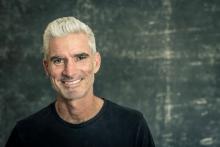
Craig Foster
Meet Craig
After a celebrated football career as captain of the Socceroo’s, Craig Foster turned his attention to the screen where he gained recognition as a three-time Logie winning sports broadcaster.
In 2019, Craig spearheaded a global lobbying campaign to free Bahraini-Australian footballer Hakeem al-Araibi from wrongful imprisonment abroad. Following Hakeem’s safe return home, Craig was personally thanked by the Prime Minister and became a finalist for the Human Rights Commission medal.
As an Amnesty International Human Rights Ambassador, Craig has led several high-profile campaigns including #GameOver which called for the release of over 400 refugees and people seeking asylum detained by the Australian Government.
Craig was part of a team of advocates who successfully secured the evacuation and resettlement of over 100 Afghans from Kabul in 2021, including the Afghan National Women’s Football Team, female TaeKwonDo athletes and a group of young Tajik girls who are the focus of the powerful film, ‘Die or Die Trying. Escaping the Taliban.’
Craig is an Adjunct Professor of Sport and Social Responsibility with Torrens University where he teaches sports industry figures how to utilise the sector for social justice and change. He is also a member of the Multicultural Council of Australia, an honorary appointment to the Member of the Order of Australia (AM) and finalist nomination for the NSW 2021 Australian of the Year.
What does ‘Racism It Stops with Me’ mean to Craig?
As a renowned athlete, media personality and white male in Australia, Craig Foster recognises his position of privilege.
For Craig, this comes with a responsibility to call out injustice and inequity.
“[Australians] have a responsibility to interrogate our own understanding, prejudices, and institutions in order to bring to life our cultural values of fairness and equality.”
Craig feels that this campaign is a tool to trigger important conversations and develop our collective understanding of racism, both at the individual and institutional level.
He acknowledges that anti-racism isn’t about one-off actions, but is a commitment to challenging the biases that are woven into the fabric of our society.